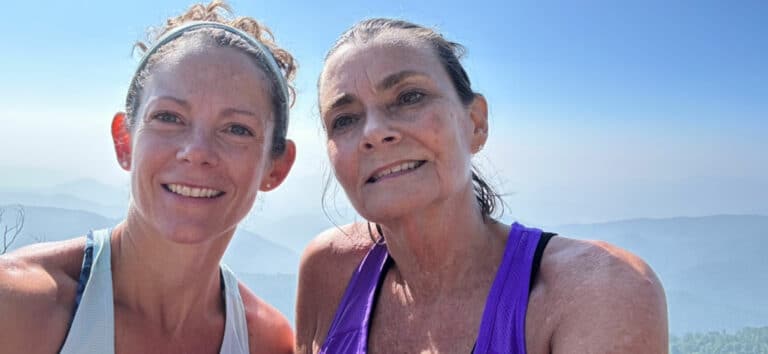Hundreds of hikers set foot on the Appalachian Trail each year with aspirations of reaching the other end some 2,180 miles away. It’s a feat that defines challenge: saying farewell to modern-day comforts, family, and friends to follow the same white blaze through 14 different states. To some, that might sound like a much-needed break from the “real world.” To others? Borderline insanity.
Regardless of experience level, nearly every backpacker will hit a low point on the trail. It’s at this stage that the true magic and beauty of the Appalachian Trail shines through, manifested not in its sweeping vistas or blooming mountain laurel, but in the tight-knit community that surrounds it. Hostel owners, trail angels, former thru-hikers, even that local farmer who just happened to be driving to town with his pickup truck and an extra hour to kill: it is through these sometimes premeditated, often chance encounters within the Appalachian Trail community at large that a bad day for a thru-hiker can turn into the best one.
We talked with 10 individuals who live and breathe the Trail to get the story behind the not-so-glamorous, but incredibly influential, lives our guardians of the white blaze lead.
Georgeanna Morton
Owner, Mountain Crossings
Blairsville, Ga.
For any northbound hiker, the first 30 miles of the trail are comprised of some of Georgia’s most difficult terrain. It can come as quite a surprise for the unprepared hiker, but luckily help is not far off. Mountain Crossings, the first outfitter located along the Appalachian Trail (the trail literally runs through the shop), is owned and operated by Georgeanna Morton and her fiancé Logan. The couple, former thru-hikers (’09) themselves, took over the business in November of last year.
Now, they’re as busy as ever, helping thru-hikers get off on the right foot as early as February. Aside from the generous hospitality, hot showers, and clean beds, Mountain Crossings is mostly known for its “shakedown,” a thorough item-by-item inspection of each thru-hiker’s pack. Given that Mountain Crossings’ staff members are former thru-hikers themselves, customers genuinely appreciate the advice and know that the staff there speaks from personal experience.
“It’s hard not to, but we laugh at the cast-iron skillets people come with, the full poker sets, the perfume, and diamond earrings,” Morton says. “We’ve seen hikers come in with way too much toilet paper, and even a full-sized alarm clock.”
Because of its shakedown, Mountain Crossings is also known for the large amount of packages they mail back home for hikers: 9,000 pounds of UPS shipments last season alone kept their crew more than busy.
“That’s why we do it,” Morton says. “One of the most rewarding things about this job is being able to help hikers with a dream.”
Bob Peoples
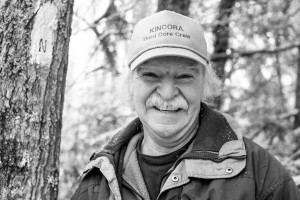
Owner, Kincora Hiking Hostel
Hampton, Tenn.
As hikers pass through the mountains of eastern Tennessee and over the open expanse of balds, they should take a moment to stop and smell the wildflowers, admire the view, and give thanks for Bob Peoples. A small man with a solid build, big heart, and a thick Boston accent, Peoples is the lead trail maintainer for the Tennessee Eastman Hiking & Canoeing Club, owner of the Kincora Hiking Hostel, and founder of the Hard Core Trail Crew, the largest hiker-fueled trail maintenance event in the region. After Peoples retired from the military, he and his wife took a road trip from Springer Mountain to the Pennsylvania line with one mission in mind: find property within a half-mile of the Appalachian Trail.
“I’ve enjoyed it because each day you meet somebody new from someplace in the world,” Peoples says. “It’s such a good community because basically age, sex, country of origin, language you speak, money in your bank account, means absolutely nothing. The white blazes don’t care. Everybody’s equal out here.”
Since opening his hostel in 1995, Peoples has hosted over 20,000 hikers. He says of those 20,000 hikers, he has only kicked out one person and refused entry to four.
“I grew up in Boston,” Peoples says. “I’ve met that many jerks in 15 seconds. If the so-called ‘civilized’ world was half as good as the hiker world, we wouldn’t have all these problems.”
When Peoples isn’t maintaining his sections of trail during the winter months, you can typically find him abroad hiking a trail few have ever heard of. From spending four years of his life in Panama to trekking both the Camino Portugués and the traditional Camino de Santiago, Peoples has visited nearly every continent and has no plans of stopping any time soon.
“The best people I’ve ever met aren’t the type to make the front page of the news, but they’re what make the trip.”
“Survivor Dave” Levy
Shuttle driver
Roswell, Ga.
They don’t call him “Survivor Dave” for nothing. A haven on wheels, “Survivor Dave” Levy drives around a Ford Expedition to shuttle hikers and help them resupply basic necessities. Levy lives about a two-hour drive from the trailhead at Springer Mountain. He meets a large number of thru-hikers before they even set foot on the trail.
“For me, it kinda keeps the dream alive of completing the entire A.T.,” Levy says. “I like meeting people from all over the world and all walks of life.”
A Miami-bred executive chef for nearly 30 years, Levy left the catering business he owned and operated in 2005 for a life of hiking. Although he had always envisioned a thru-hike for himself, he says he’s stayed plenty busy by hiking the entire state of Georgia, now his home turf, a total of ten times. After countless encounters with thru-hikers on the trail and in town, Levy decided to purchase a small Chevy truck in 2008. He started offering rides and selling small thru-hike essentials, such as fuel, AWOL’s The A.T. Guide, and Aquamira at cost out of the back of his truck.
“I am by no means an expert hiker or even remotely close,” Levy says, “but I do know my state and what it would take to thru-hike.”
Although he runs a one-man-show and logs hundreds of hours on the road every season, Levy’s busy schedule doesn’t keep him off the trail. When he’s not hauling a truckload of grungy hikers and their too-ripe gear, he’s in the woods.
“What do I like about hiking? I like everything about hiking,” Levy says. “You put one foot in front of the other and then you do it again and again and again. It’s the peacefulness, the solitude, but also the people.”
Ron Haven
Owner, local motels
Franklin, N.C.
Born and raised in the small town of Franklin, Ron Haven has seen the hiking culture there grow every year. As a high school student, Haven spent the summers working on a trail maintenance crew near his hometown.
“At that point in time you didn’t see that many people from other places,” Haven says, “but you always found some nice person out there on the trail. I met hikers not only from other states but other countries.”
Those early interactions with the thru-hiking community left a memorable impression on the young Haven and inspired him to leave his hometown to see more of the world. During the late ‘70s and early ‘80s, he traveled throughout Georgia, Texas, and Mexico working as a professional wrestler under the name of El Grande Apollo. Eventually, in 1987, Haven returned to Franklin to start his own business but took a greater interest in helping out the increasing volume of thru-hiker traffic that came through town. From free shuttle rides to discounted rates at his motel chain, Haven pours his heart into offering help to the hiking community for little to no charge at all.
“Trail angels are special people,” Haven says. “You have to be able to have this be in your heart and not be looking for a profitable business. Anything less than helping the hikers be successful would be a failure.”
Because Haven is so familiar with the area’s trails, emergency personnel often call him first when a hiker is stranded, lost, injured, or missing. He says he takes great pride in knowing that he can help someone in need and wants future hikers to know that they are not alone on the trail.
“I try to do a lot for them to tell them from my heart, not my mouth, that there is another world of people out here and to go out and enjoy it.”
Elmer Hall
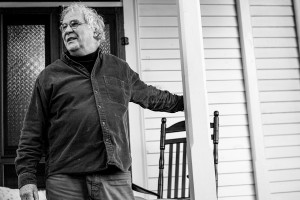
Owner, Sunnybank Inn & Retreat
Hot Springs, N.C.
When former chef and restaurant manager Elmer Hall took a leave of absence in 1976 to hike the Appalachian Trail, he never expected the trail to shape the rest of his life. Although he did not finish the entire trail, Hall says the journey completed him in a way that his nearly 20 years of restaurant experience never had.
“Talk about a square peg, round hole,” Hall says. “The trail changed me so much that it didn’t take long for me to realize I wanted to move somewhere closer to the mountains and the trail community.”
Having spent a number of days in Hot Springs during his hike, Hall returned to the town in 1978 and helped out the then-owners of the Sunnybank Inn & Retreat. The Inn, which hosted the first thru-hiker, Earl Shaffer in 1948, was 100 years old and steeped in history and charm. When the owners offered the inn to Hall, he immediately accepted.
“Running a small hostel meant I didn’t have to work for a large amorphous institution as you would when you work in the city,” Hall says. “That hectic career stuff was conflicting with the way I wanted to live.”
Hall has largely kept the Sunnybank Inn as it was when he came through town over 30 years ago, although he’s brought his years of culinary experience to the Inn’s idyllic kitchen. His specialty is vegetarian food, and Hall provides breakfast and dinner each day. The food is handmade, prepared mostly from local and organic ingredients. He says seeing the hikers come through reminds him of the same freedom and humility he experienced during his hike.
“That inner sense of feeling less of your own ego but transcending into the natural world that’s there and has been there for many eons, it’s a pretty impressive thing.”
“Baltimore Jack” Tarlin
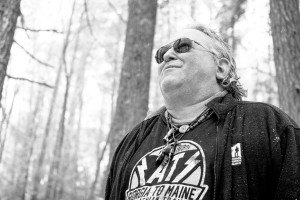
Seven-time thru-hiker
Boston, Mass.
Imagine giving up a steady “suit job,” as Tarlin says, in your mid-thirties for a life on the trail. After first attempting a thru-hike in 1995, that’s just what Tarlin did.
“I got three broken ribs from a bad fall,” he says, “so I didn’t finish. It bothered me that I wasn’t able to finish.”
Tarlin eventually returned to the trail a year later to complete the short section through Maine he had missed, yet still remained bothered by the fact that he didn’t complete the journey “all in one whack.” He decided to set out again, this time with the intention of completing the thru-hike in under a year.
“I asked work for a leave of absence and they wouldn’t give it to me, so I quit,” Tarlin says.
Although his decision may seem rash, it was a response to a deeper calling. After all, Tarlin’s father helped complete the A.T. back in the 1930s: the spirit of the trail is in his blood. Even after successfully completing his first thru-hike in 1997, he returned to the trail every year for the next six years. Tarlin has consecutively thru-hiked seven times from 1997 until 2003 and section-hiked twice.
“Why I kept going back I just don’t know,” Tarlin says. “Everything is different. If it was the same trip, that would get very tiring.”
When Tarlin wasn’t hiking during the season, he was finding work with local outfitters and acquaintances from the trail community to earn money for the upcoming hike. Although he hasn’t thru-hiked in over a decade, a love of hiking remains a constant thread in the web of his rambling ways. He still floats from trail town to trail town, helping out at hostels or outfitters during the thru-hiking season.
“I spent most of my adult life living and working in cities,” he says. “It’s really important for people to get out and remember that there are other things and places in this world.”
Jeff Patrick
Owner, Mt. Rogers Outfitters
Damascus, Va.
When hikers step from the woods and follow the trail down the main drag of Damascus, Va., Trail Town, U.S.A., they likely follow the white blaze right to the front door of Mount Rogers Outfitters (MRO). Whether you’ve blown through the last semblances of tread on your shoes or your raw hip bones merely won’t stand another minute of that ill-fitting pack, MRO owner Jeff Patrick will set you straight again. He’s the go-to guy in these parts for shoe and pack fitting, tarp rigging, or just about any do-it-yourself gear project you can think of.
“Helping other people is a way of living,” Patrick says.
Born and raised in the mountains of southwest Virginia, Patrick has been hiking in the woods his entire life. His father started MRO nearly 25 years ago and impressed upon a young Jeff the importance of wilderness.
“There’s a whole other aspect of living and most people don’t have a clue,” Patrick says. “The higher quality of living ain’t a big house and a shiny car. It’s fellowship with the outside and the meandering along the way.”
Every year, Patrick helps hundreds of hikers continue on those Appalachian meanderings. He’s a modest man who doesn’t own a phone or have a Facebook profile and wants nothing to do with mobile technology. For Patrick, even a guidebook takes away from the fundamental experience of a walk in the woods.
“If you only have the minimal knowledge necessary, then when you see somebody coming along the trail, you begin to write your own book. You have your own chapter,” he says.
The annual Trail Days festival in May is the town’s signature event, and Patrick’s been there for nearly every single one. Although the times have inevitably changed, the core values of the festivities remain true to ensuring the well-being of thru-hikers past, present, and future. The postcards and photographs from Mount Katahdin that clutter his desk and walls are testament to the number of experiences he’s influenced over the years.
“There have been so many stories,” Patrick recalls. “If I really gave a flip about making a million dollars, I’d write my own book. But I’m not really interested in making a million dollars.”
“TrailAngelMary” Parry
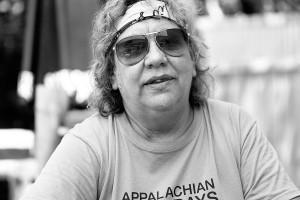
Trail angel
Duncannon, Penn.
In 2001, Mary Parry was suddenly and unexpectedly homeless. Struggling to cope with this turn of events, Parry stowed her belongings in a storage unit, reserved a campsite in the Riverfront Campground, and summoned every last reserve of positivity she could muster. It was mid-April, and with the oncoming warm weather she was easily able to find work at a nearby restaurant. Soon, Parry began to notice that the campground was steadily becoming more crowded and not with the large Coleman tents of vacationing families: these tents were smaller with weathered rain flies and a certain smoky-sour aroma. She quickly learned that these tents belonged to thru-hikers who were headed north for Mt. Katahdin via the Appalachian Trail.
“At the time I didn’t even know the A.T. existed,” Parry says, “but I figured the hikers could use some extra potassium.”
Every few days, Parry would trek to the grocery store and buy bananas, handing them out to hikers at the campground. Little did she know that this small act of selflessness was what thru-hikers referred to as “trail magic.” By the end of the season Parry was no longer introduced as Mary: she was now, and would be forever, TrailAngelMary.
“It’s one big family,” she says. “When you meet someone in the trail community it’s as if you’ve known them all your life.”
Parry eventually found housing in early September of that year, but the new lodging situation did not change her newfound passion for trail magic. For years, Parry would cook for incoming hikers, feeding a ravenous crew nearly every Wednesday and Sunday in the summer. Now, however, she’s seen as more of a motherly figure in the community, offering rides to hospitals and a free living room floor for injured or financially challenged hikers. Every July, Parry helps organize and run a three-day event for hikers coming into Duncannon.
Although she suffers from arthritis in both knees, she makes a point of getting on the trail as much as possible. Hiking, she says, “is good for your soul, your heart, and your mind.”
Chet West
Owner, One Step at a Time
Lincoln, NH
Having grown up in the shadow of Mt. Moosilauke and the White Mountains, Chet West was exposed to the hiking culture at a very young age. In 2001, West was in the midst of preparing for his very own thru-hike of the A.T. when a simple camp stove test turned into a trip to the ER.
“I was wearing fleece and nylon,” West says. “I remember that. I remember a pump-pump-pump-POP and being engulfed in flames. I spent the next eight-and-a-half months in a drug-induced coma.”
Suddenly, West had gone from a strong, capable man to a mere whisper of his former self. Every major organ failed multiple times, and in the course of his slow and painful recovery his heartbeat flatlined a total of nine times. For West, the future did not look good.
“They told me I would never walk again,” he says. “I have good days and bad days, but to date I’ve taken 37 steps.”
Prior to West’s accident, he was an active young adult who cycled and walked nearly everywhere. Although he now spends about 80 percent of his time traveling by wheelchair, stopping activity entirely was out of the question for a restless West: he’s pedaled three different recumbent tricycles into the ground from so much riding.
In early 2007, West used the settlement money from his accident to purchase a house near the A.T. with the intent of starting a hiker hostel. He opened his doors just in time for the first thru-hikers of the season to arrive and, with the help of a few from that first crew, he soon had six plywood bunks for his guests. West’s hostel, which he appropriately named One Step at a Time, quickly gained reputation as one of the friendliest hostels on the trail.
“I don’t care if you don’t have a penny. I don’t do this for the money,” West says. “If you’re an artist, draw me a picture. If you’re a musician and you have your guitar or mandolin or saxophone, play me a song. If you’re a chef, cook dinner for everyone.”
West’s hostel is emblematic of his steady fight against a sedentary life, no matter the obstacles that battle may present. He says his interactions with the thru-hiking community in particular provide the physical and spiritual motivation he needs to keep going.
“Everyone that comes through here is an inspiration,” West says, “not just me.”
Through the lens of a hiker…
Joshua “Still Don’t” Niven
Appalachian Trail Thru-Hiker, ‘13
Huntersville, N.C.
Joshua Niven lives for the moment. His passion is two-fold: photography and the Appalachian Trail. In fact, had it not been for the A.T., Niven might very well have chosen not to pursue his photography passion at all.
“As I started hiking more I figured these things out,” Niven says. “I remember telling myself, ‘I know I have to do a project on the A.T.’”
After studying for five years to obtain his degree in photography, Niven did just that. His brainchild, The Thru-Project, visually chronicles his journey along the trail through photographs of the people and places he and his three-man crew encountered.
“Hiking the trail is quite a unique experience,” Niven says. “It’s like a mini lifetime. You’re doing 10 years worth of work in a six-month timeframe.”
From epic cold spouts to dwindling financial resources and, of course, the difficulties faced when four males spend six months in the woods together, Niven says it was through some of those hardships that the most amazing things occurred. He remembers one instance that was particularly profound, in which a couple on vacation helped Niven and his group when their canoe started leaking during an aquablaze excursion.
“All of a sudden we became part of their vacation and they became part of our hike,” Niven says. “It was a humbling experience every time you met someone you didn’t know and within five minutes they had changed your life entirely. You find out quickly on the A.T. that there are so many people out there who want to give with nothing in return. That’s magic. That represents something beyond us.”
Niven is now in the process of releasing the images from his experience and plans to compile the photographs in a picture book documenting the journey. As he methodically sorts through the 15,000 images he captured, he says each photograph takes him back to a person, a view, a moment, a little snippet of magic.
“Without the people that we met, we would have never made it.”
HIT THE TRAIL
– Not everyone can up and leave their work and family for a 6-month jaunt in the woods, but if you’re looking for a weekend hike that hits the highlights of the Appalachian Trail, our white blaze guardians have some suggestions for you.
Georgia:
– Blood Mountain: ~7 miles
Follow the Reece Memorial Trail and head south when it crosses the A.T. This overnighter takes hikers up Blood Mountain, which, at 4461’, is Georgia’s highest point on the trail and affords some breathtaking views of the area. Take the Freeman Trail back to your car for a beginner-friendly loop.
North Carolina:
– Standing Indian Mountain: ~10.5 miles
This moderate out-and-back trip follows the A.T. northbound from Deep Gap up to Standing Indian Mountain, the highest point on the trail south of the Smokies. The high elevation and beautiful scenery here will make you feel like you’re days from civilization. Connect to the blue blazed Timber Ridge Trail to climb back down to USFS 67 to catch a shuttle.
– Max Patch: ~ 5.8 miles
Start at the Lemon Gap trailhead at 3550’ and follow the A.T. as it climbs up to Max Patch. You’ll get the full experience of the “green tunnel effect,” as the majority of this short overnight hike (or longer day hike) is entirely shrouded by trees with the exception of Max Patch. On a clear day, expect 360-degree views of Mt. Mitchell and the Smokey Mountains from the bald.
– Allen Gap: ~20 miles
If you want to put in some big miles and tackle some serious elevation, take the A.T. as it rolls along from Allen Gap to Devils Fork Gap. With rugged terrain, outstanding vistas, and rhododendron masses, this is a great hike to try in the spring when the rhododendron is in bloom. Evenly spaced shelters afford hikers the chance to make this a two- or three-day excursion.
Tennessee:
– Carvers Gap: ~13.4 miles
In northeastern Tennessee, the impressive Roan Massif is home to a number of striking grass balds and some of the area’s most unique species of flora and fauna. Roan Mountain and the surrounding balds were not included in the original A.T. route until the mid-70s, but the thought of its exclusion is too much to bear. See why for yourself and make this a challenging day hike or a casual overnighter.
Virginia:
– Grayson Highlands and Mt. Rogers: ~30 miles
For a strenuous multi-day hike, begin in Damascus, Va., where the trail heads north out of town. Stay the night at Lost Mountain Shelter before continuing the steep ascent up to Whitetop Mountain and Buzzard Rock, both of which offer killer climbs and views. Stay at Thomas Knob Shelter the next night and take the spur trail up to the summit of Mt. Rogers in the morning, the tallest peak in Virginia.
Pennsylvania:
– Peter’s Mountain: ~ 10 miles
Pennsylvania is known for its rocks. Get just a taste of it on this rocky yet relatively flat day hike, which provides hikers the chance to see the Susquehanna River from Shikellimy Rocks and Table Rock. Hikers also often report sightings of black bears along this ridge walk, so keep your eyes open and your camera at the ready.
New Hampshire:
– Mt. Moosilauke: ~ 7.8 miles
By way of the Beaver Brook Trail (also the A.T.), follow the steep climb past the ruggedly beautiful Beaver Brook Cascades. You’ll gain roughly 3000’ in elevation during this out-and-back, but the alpine meadow at the summit of Mt. Moosilauke is well worth the effort. The above-treeline view is home to ancient evergreens and spruce trees. It’s a perfect day hike any time of year, although spring and fall are exceptionally pretty.
Baltimore Jack’s Trail Food Picks
Putting in some serious miles on the trail means working up a serious appetite. Check out these five thru-hiker friendly restaurants along the A.T. where you can whet your whistle, stuff your face, and repeat.
– Doyle Hotel – Duncannon, Penn,
– The Inn at Long Trail – Killington, Vt.
– Dot’s – Damascus, Va.
– The Homeplace Restaurant – Catawba, Va.
– Ming Garden – Waynesborow, Va.


